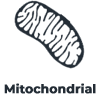Nigella Sativa Extract, also known as Black Seed Extract, Black Seed Oil, Nigella Sativa Oil, Black Cumin, or Kalonji, is a seed extract that comes from a plant that is native to Southwestern Asia. Nigella Sativa seeds have been used for over 2000 years for their aroma and flavor in cuisines as well as their reported health benefit properties. In fact, archaeologists found black seeds in King Tut’s tomb and the Prophet Muhammad once touted black seed oil extract as a “cure for every disease except death." While we now know that this statement is very much hyperbolic, many modern-day studies have since found that black seed oil extract does, in fact, contain many potential benefits for our overall health and cognition.
Nigella Sativa: The Top Health Benefits Of Black Seed Oil Extract
What Is Nigella Sativa?
What are the Benefits of Black Seed Oil?

Nigella Sativa Seeds
Traditionally, black seed oil extract has been used for pain management support, digestive health, promoting healthy levels of inflammation, and skin health to name a few. In no particular order though, let's take a deeper dive into some of the most profound benefits of this ancient seed from the Nigella Sativa plant.
Nigella Sativa Scientific Research
1. Nigella Sativa Supports Cognitive Function & Memory
Given that Acetylcholine is an extremely important compound in the body for memory retention, brain function, muscle function, REM sleep, and endocrine system regulation, it would make sense that you would want enough available for your body to use efficiently. Thankfully, black seed extract has a powerful ability to inhibit AChE, an enzyme that breaks down Acetylcholine in the body. This effect can be attributed to it’s high Thymohydroquinone content, one of the strongest natural acetylcholinesterase inhibitors. By inhibiting acetylcholinesterase, acetylcholine is broken down at a much slower rate. This allows for more activation of cognition enhancing acetylcholine receptors such as the alpha 7 nicotinic acetylcholine receptor and the M1 muscarinic acetylcholine receptor

Acetylcholine Structure
What Does Acetylcholine Do For Our Bodies and Brain?
Taking a deeper look into the benefits of one of the most prominent and powerful neurotransmitter in the brain, Acetylcholine has been shown to promote neuroplasticity, which is directly correlated with learning and memory. Cholinergic neuroplasticity is likely regulated by the alpha 7 nicotinic acetylcholine receptors. Activation of the alpha 7 nicotinic acetylcholine receptor causes a release of glutamate in key areas of the brain that are important for neuroplasticity. The release of glutamate caused by activation of nicotinic acetylcholine receptors leads to a higher ratio of AMPA and NMDA receptors. These receptors play a key role in neuroplasticity by driving a process called long term potentiation (LTP). During LTP, activation of NMDA receptors by glutamate causes a cellular response which leads to the insertion of an AMPA receptor onto the neuron. Activation of AMPA receptors increases the sensitivity of NMDA receptors, and thus, the likelihood that NMDA receptors become activated increases as more AMPA receptors are inserted. This creates a loop where more and more AMPA receptors are inserted. This ultimately leads to a much stronger connection between neurons, and this process is one of the main ways by which neuroplasticity is driven. This is why, glutamate release caused by activation of alpha 7 nicotinic acetylcholine receptors leads to increased neuroplasticity, as there is a higher likelihood NMDA receptors will become activated.
Thymoquinone from Black Seed Oil Extract and its Effects on Acetylcholine
A recent study also found evidence for thymoquinone being a direct activator of alpha 7 nicotinic acetylcholine receptors. As discussed above, this is obviously very interesting from a neuroplasticity point of view. However, it is also very interesting from an inflammation point of view. The alpha 7 nicotinic acetylcholine receptor is one of the main regulators of inflammation within the brain. By activating the alpha 7 nicotinic acetylcholine receptors, we can promote healthy levels of inflammation in the brain. This is highly important, as inflammation has been shown to be a negative regulator of cognitive function. Furthermore, it appears that inflammation can bottleneck neuroplasticity. From an anecdotal stand point, it has been widely reported that regulation of inflammation in the brain may decrease brain fog, thereby leading to much clearer thought

Thymoquinone Structure
Furthermore, the thymoquinone content of black seed oil appears to be a non-selective histone deacetylase (HDAC) inhibitor. It has been theorized that inhibition of HDAC’s can lead to neuroplasticity. It is thought that this occurs by elevating brain derived neurotrophic factor (BDNF). BDNF acts on a receptor called the TrkB receptor and activation of this receptor sets into motion a large neuronal cascade that ends in enhancement of neuroplasticity. To read more about the effects of BDNF in relation to neuroplasticity, it is worth reading our 7,8-DHF blog which explains this in a more in depth manner. The net result however, is that both via cholinergic mechanisms and HDAC mechanisms, black seed oil can enhance overall neuroplasticity. This is would not be surprising as black seed oil supplements appears to lead to significant memory and mood support.
One study done on rats showed that 20 weeks of daily black seed supplement intake improved memory formation. In another study done on humans, 40 volunteers were recruited and divided into two groups, one group was given 500mg of black seed extract twice daily for 9 weeks, while the second group was given a placebo. After 9 weeks, the scores showed a significant difference in the black seed supplement group, with their scores in a logical memory test far exceeding the placebo group.
Black seeds from the Nigella Sativa plant not only increase Acetylcholine in the body, but due to it’s very high Thymoquinone content, it also allows for higher levels of GABA, a neurotransmitter well known for its ability to help calm, and improve cognitive function in individuals. Studies have shown that high levels of GABA were associated with higher IQ levels, as well as better cognitive performance. The manner is which thymoquinone increases GABAergic activity is still somewhat unknown, however, there is a theory that thymoquinone suppresses inducible nitric oxide (iNOS). iNOS produces cyclic guanosine monophosphate (cGMP) which suppresses GABAA receptors. Thus, by suppressing iNOS, black seed oil could potentially allow for more sensitive GABAA receptors. In addition to this, it has also been shown that thymoquinone simply enhances GABA levels. The combined effects of all of these mechanisms lead to a very calming effect, but one that does not lead to significant lethargy.

Nigella Sativa Flowers
If you are somebody who loses their train of thought often, has a hard time staying focused, has difficulty remembering things, frequently loses belongings or has a hard time finding the right words during speech or writing, using a Nigella Sativa extract supplement to get an increase in Acetylcholine and GABA might be just what you’re looking for.
2. Nigella Sativa Supports Weight Loss
In a recent study, 50 obese women were divided into two groups. The first group was supplemented with Nigella Sativa extract, while the other group was supplemented with a placebo. Those in the Nigella Sativa group lost four times more weight than the women in the placebo group, despite having the same diet and exercise regimen. A difference of 8% body fat reduction vs 2%. Not only was this study done with women, but it was also done with men aged from 30-45. The results were also similar, with those in the Nigella Sativa supplement group having marked improvements in body weight and waist circumference.
This is most likely due to not only it’s phytosterols, but it’s high levels of oleic acid, a fatty acid that is commonly known to improve the rate at which your body burns fat.

3. Nigella Sativa Supports Digestion
With more and more research surfacing that states the importance of digestive health for overall well-being, it’s vital to try to optimize your digestion in every way possible. Black seed extract has been shown to aid in digestion and soothe intestinal discomfort.
4. Nigella Sativa Supports Liver Health
In a world where we’re constantly exposed to toxins, it’s vital for the liver to function at its highest capacity. In a recent study, 70 patients with poor liver function were split into two groups. One group was given a placebo, while the other group was given 1 gram capsules of ground black seed extract powder twice per day. The participants were followed for 3 months, and were evaluated on their weight, BMI, and liver enzymes. After those 3 months, the group that used a black seed extract supplement showed vast improvements across all indicators. Body weight reduction and BMI reduction were shown to be entirely a product of black seed supplementation

Body Mass Index Chart (BMI)
5. Nigella Sativa Supports Healthy Immune Function and Promotes Healthy Levels of Inflammation
In a study done on 66 people with allergies, black seed was given in oil form for one month. All participants noticed a significant reduction of symptoms such as itching, sneezing, and nasal congestion. This study was also performed on 152 participants who also suffered from allergies, and they also noticed a reduction of symptoms at a dose of 40-80mg/kg of black seed oil a day. As shown by the evidence, there is a strong case for black seeds as a natural approach to allergy support. This may especially come in handy when the trees and flowers in your area decide to collectively release their pollen at the same time. For a lot of people, autumn can be tough due to persistent minor allergies. Nigella Sativa extract may help alleviate some of this discomfort.
Recent research has indicated that thymoquinone is a powerful regulator of inflammation and supports healthy immune function. It does this mainly by acting on the main regulators of inflammation and immune function, which are: cyclooxygenase (COX), 5-lipoxygenase (5-LOX), prostaglandin D2 (PGD2), leukotrienes (LTs), interleukins (ILs) and tumor necrosis factor alpha (TNF-alpha). By regulating these factors, that are both involved in inflammation and immune function, thymoquinone can help significantly promote healthy levels of inflammation and give a good boost to overall immune function.
6. Nigella Sativa Promotes Mood and Relaxation
In a 2014 study, 48 healthy males aged from 14-17 were split into two groups. One group was given 500mg of black seed extract in capsule form, while the other was given a placebo. Each participant was instructed to take each one capsule daily for four weeks. Over the 4 week study period, the use of black seed extract as a nutritional supplement proved to support mood, relaxation, and cognition. This is once again due to its effects on the GABAergic system.
The Differences Between Nigella Sativa Powder vs. Oil

Black Seed Extract Powder
Traditionally, using a black seed oil supplement will only provide you with an average of 1% Thymoquinone content. This is in stark contrast to the powder that Nootropics Depot carries which has 5 times as much at 5% Thymoquinone content! Not only is the thymoquinone content higher, but it is also available as a powder or in capsule form. This makes measuring out dosages and incorporating Nigella Sativa extract into a supplement regimen much more convenient. The high thymoquinone content is also particularly interesting as most of the benefits of black seed oil can be traced back to its thymoquinone content.
Conclusion: Nigella Sativa Extract Supports Our General Health and Brain Function
As more and more studies start so surface, it becomes quite apparent that this ancient seed from the Nigella sativa plant may have a profound impact on your health and well being. Through the support of cognitive function, liver health, digestive health, and metabolic function; it is definitely making a case for quite a strong supplement for overall health.
Anecdotal research alone shows many users of Nigella Sativa reporting feelings of elevated mood, sleep support, less brain fog, feeling more present, healthy stress levels, and supporting cognitive performance.
Black seed extract consumption is generally recognized as safe, as after all, it has been consumed for over 2000 years!
| New Column | New Column |
View more Nootropics Depot blog articles by clicking the links below:
The Best Supplements to Support Collagen Synthesis and Skin Health
Ashwagandha Benefits: An Ayuverdic Herb For Stress Support, Immune Health, and Restful Sleep
CoQSol-CF CoEnzyme Q10: The Superior CoQ10 Supplement Over Grocery Store Brands
The Top 5 Milk Thistle Health Benefits
A Closer Look At The Top 5 Taurine Benefits
Melatonin Supplements: Did You Know This Popular Over The Counter Sleep Aid Is Often Overdosed?
Nootropics Depot's Guide to the Top 10 Natural Nootropics of 2018
EpiCor Immune Health: The Natural Immune Boost Supplement You May Not Know About
Magnesium Glycinate vs. L-Threonate: Which Is The Best Magnesium Supplement?
Cognizin Citicoline: A Choline Supplement That Supports Healthy Brain Function
7,8-Dihydroxyflavone: A Brain Health Supplement That May Support Neuroplasticity
Creatine: A Nootropic for Bodybuilders, Athletes, Vegans, Vegetarians Alike
How to Find the Best Curcumin Supplement and What to Know Before You Buy
Comparing Rhodiola rosea Extracts: Rosavins vs. Salidroside
Berberine: A Look at the Potential Benefits of this Versatile Supplement
Lion's Mane Mushroom: Comparing our 1:1: and 8:1 Extracts
Nitric Oxide Boosters Reviewed: L-Citrulline, Agmatine and AAKG
Red Reishi Mushrooms: Comparing our 1:1 and 8:1 Extracts
Comprehensive Guide to the Best Anti-Aging Supplements
Cordyceps Militaris Mushrooms: Comparing our 1:1 and 10:1 Extracts
Bacognize vs. Synapsa: Which Ayurvedic Herb is Right for You?
The Nootropic Synergy of Caffeine + L-Theanine
L-Citrulline vs. L-Citrulline DL-Malate: Which is Best?
Shilajit: A Look at this Amazing Ayurvedic Compound
The Ultimate Guide to Nootropics
Mushroom Extracts: Whole Fruiting Bodies vs. Mycelium On Grain
Teacrine: The Alternative to Caffeine
Zembrin: A Natural Way to Boost Your Mood
Ashwagandha: KSM-66 vs. Sensoril
Panax Ginseng: What You Might Not Know
Palmitoylethanolamide: Known for its Pain Reducing Qualities
Put to the Test: A Look at Nootropics Depot's Purity Testing
Browse More From Nootropics Depot
Ayurveda | Adaptogens | Amino Acids | Choline Supplements | Fitness Supplements | Immune Support | Metabolism Supplements | Mushroom Extral Nootropic Capsules | Natural Pain Support | Patented Nootropic Extracts | Sleep Support Supplements | Softgels | Solutions + Sublinguals | Enteric Coated Tablets | Nootropic Samples
Attention: These statements have not been evaluated by the Food and Drug Administration These products are not intended to diagnose, treat, cure or prevent any disease.









